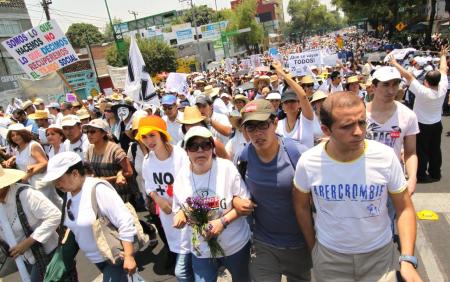From the front pages of the national daily, La Jornada, we get a glimpse of the last two days in Mexico:
Indigenous Oaxacans Ambushed: Nine Dead and Ten Wounded
Another Narco common grave discovered in Durango: 218 Bodies the New Total
Confrontation in Guerrero leaves 12 dead: Three Police and Nine Hired Killers
Twenty-Seven People Murdered in Guatemala: [Mexican] Zetas Blamed
Pick any two days; pick any national newspaper; the headlines will not be all that different.
 Last week’s massive “National March for Peace with Justice and Security” called for, among other things, the naming of the killers and the dead: the active investigation of all murders, disappearances, kidnappings, clandestine graves and person trafficking, along with the publication of the names of the victims and the “material and intellectual authors” of these crimes.
Last week’s massive “National March for Peace with Justice and Security” called for, among other things, the naming of the killers and the dead: the active investigation of all murders, disappearances, kidnappings, clandestine graves and person trafficking, along with the publication of the names of the victims and the “material and intellectual authors” of these crimes.
Many marchers carried homemade banners denouncing kidnappings and disappearances at the hands of the state—particularly the military and local political bosses—and not just the criminal gangs. Many blamed the actions of those in power for at least a portion of the country’s growing insecurity: Those who are supposed to protect the citizenry from criminal violence are powerless or unwilling to do so, or worse, are directly responsible for the violence itself. In many parts of the country, most dramatically right now in the states of Oaxaca and Michoacán, the demands for public security are demands to end the impunity that still characterizes large parts of Mexico’s old corporate apparatus.
Local political bosses (caciques), drug cartels, professional hit squads, and corrupted law enforcement agencies have effectively carved out areas in which state violence has come under essentially private control. Despite renewed calls for “transparency” in government, the exercise of political power in Mexico remains opaque at all levels, from the nation state on down.
The country is suffering a rash of kidnappings for ransom, for which there are no reliable statistics since the families of the victims don’t always see fit to (or are in no position to) notify the authorities. The kidnappings are as plentiful as they are democratic, striking families of the numerous poor — some of whom might well have an emigrant relative who is able send a $500 ransom from Texas — as well as the wealthy, who are better protected and less numerous but whose families have been known to pay well into the millions of dollars.
As for the poor, according to the country’s National Commission of Human Rights, in the six-month period from April through September 2010, a total of 11,333 northward-bound migrants, some of them Mexican nationals but most of them from Central America, were kidnapped on their way to the border.
Earlier this year, some 120 such migrants were kidnapped in one fell swoop in the northern border state of Tamaulipas. Public defenders have accused migratory agents of selling the migrants to the kidnappers. Six agents are now in custody and under investigation for “crimes against the federal order.”
As the daily violence grows, the naming of the dead has given way to the counting of the dead. There is a dulling of sensibilities and a concomitant sense of inevitability. In the great majority of violent deaths there is an abstract anonymity of both the victims and the executioners. This is especially the case with the mass kidnappings and murders of Guatemalans, Salvadorans and Hondurans as they cross Mexico on their way to the U.S. border. These mass killings are perhaps the most unsettling of all because the victims, so senselessly murdered, so numerous and so far from home, have become mere statistics.

